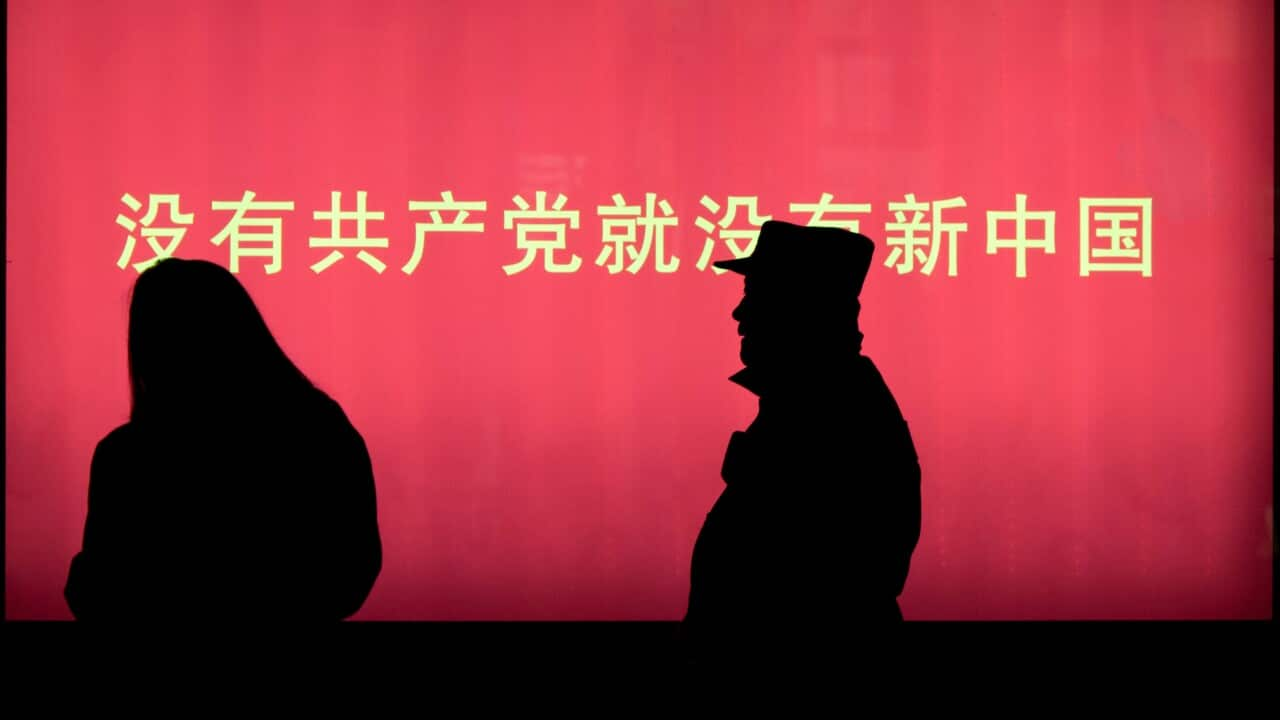Chinese President Xi Jinping delivered a stern warning to Taiwan, saying that Beijing has the will and power to thwart any attempts at independence.
Addressing a twice-a-decade gathering of the Communist Party in Beijing on Wednesday, Mr Xi warned China has "the resolve, the confidence, and the ability to defeat separatist attempts for Taiwan independence in any form".
"We will never allow anyone, any organisation, or any political party, at any time or in any form, to separate any part of Chinese territory from China," he said.
Related reading

Xi declares 'new era' for China as party congress opens
Taiwan's mainland affairs council called the Communist Party congress' comments "regrettable", saying "China cannot win over the people" through its "one China" policy.
Ties between Taiwan and China have turned increasingly frosty since the election of Tsai Ing-wen as president last year.
Beijing cut off official communication with her government shortly after it took office due to her refusal to publicly accept the "one China" concept.
Tsai also angered Beijing when she called Donald Trump to congratulate him on his US presidential election victory.
Under Taiwan's previous government the two sides had stuck to the "1992 consensus", in which they agree there is only one China without specifying which is its rightful representative.
In his speech, Xi held out an olive branch to the island's leadership, offering to restore communication with Taiwan if its government readopts the understanding.
Then "no political party or group in Taiwan will have any difficulty conducting exchanges with the mainland", he said.
The two sides split after a civil war in 1949, and while Taiwan sees itself as a sovereign nation, it has never formally declared independence.
Cross-strait tensions were further exacerbated by a highly unusual call from Tsai to congratulate then US President-elect Donald Trump.
Xi made no mention of independence movements in China's semi-autonomous city Hong Kong.
"We will develop and strengthen the ranks of patriots who love both our country and their regions," he said, adding that "patriots will be playing the principal role" in governing the metropolis, which operates under its own system of laws as part of the "One Country, Two Systems" policy.
Beijing has tightened control over the city's affairs in response to high-profile calls for democracy that have increasingly turned to calls for self-determination or even full independence.
Australia reacts to Xi's address
Foreign Minister Julie Bishop predicts a greater standing for state-owned enterprises in China during the next five years which could have implications for Australia's trade relationship.
Chinese President Xi Jinping opened the Communist Party's twice-a-decade national congress in Beijing on Wednesday with a three hour and 23 minute address.
"The prospects are bright, but the (economic) challenges are also severe," Mr Xi said.
China will relax market access for foreign investment and expand access to its services sector, as well as deepen market-oriented reform of its exchange rate and financial system, while at the same time strengthening state firms, he said.
"Openness brings progress for ourselves, seclusion leaves one behind. China will not close its doors to the world, we will only become more and more open," Mr Xi said.
But Ms Bishop was not entirely convinced.
She noted President Xi is talking up "socialism with Chinese characteristics" - a form of state capitalism.
"I think we will see a greater intensity and focus on state-owned enterprises even to the extent that the private sector in China has flourished to a degree," she told Sky News.
"I think there will be a greater concentration of power within the state-owned enterprises."
Asked if this was an issue for Australia, Ms Bishop said: "Rather than the state-owned enterprises becoming more open there is a concern that they will be less transparent."
'A new era'
Mr Xi told some 2,300 delegates at the imposing Great Hall of the People that the party must "resolutely oppose" any actions that undermine its leadership as it steers a course through a high-stakes period in its development.
"The situation both domestic and abroad is undergoing profound and complex changes," Mr Xi, who is expected to secure a second five-year term as general secretary and stack leadership positions with loyalists during the twice-a-decade congress, said.
"China's development is still in a stage of important strategic opportunities. The prospects are bright, but the challenges are also severe," he said. "Socialism with Chinese characteristics enters a new era."
Speaking in front of a massive hammer and sickle, Mr Xi extolled China's rising clout abroad and its fight against poverty and inequality at home, as well as his "zero tolerance" campaign against corruption within the party.
"Every one of us in the party must do more to uphold party leadership and the Chinese socialist system and resolutely oppose all statements and actions that undermine, distort or negate them," he said.
Considered China's most powerful leader since Deng Xiaoping or even Mao Zedong, Mr Xi could use the congress to lay the foundation to stay atop the 89-million-strong party even longer than the normal 10 years, according to analysts.
That would break the unwritten two-term limit accepted by his immediate predecessors Jiang Zemin and Hu Jintao - who were by Xi's side at the congress - and end the era of "collective leadership" aimed at preventing the emergence of another Mao.
Another signal of Xi's rise to the pantheon of Chinese leadership would be if his name is added to the party constitution, an honour that has only been bestowed upon modern China's founder, Mao, and the father of economic reforms, Deng.




